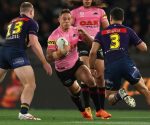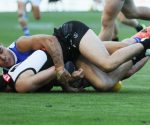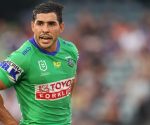Are player managers sucking the fun out of footy for NRL prodigies?
Amid the Lachie Galvin media circus – his claimed desires, the who-said-whats, the alleged bullying, the legal threats – one essential seasons-old question has remained unasked… why do players need managers?
In theory, contract signings should be straightforward. If a young player has risen through a club’s junior system, has been offered a contract and wants to play with the club, it should be a simple process.
There may be a family lawyer who can read the fine print and give the OK. A family accountant can OK the financial details to everyone’s satisfaction.
If no family connections, advisers can be paid as a one-off, and the young player can concentrate on contributing for a season or seasons, whatever the contract’s length.
The same applies for an established player when his contract ends and if he is demand from other clubs. He should know whether he will be happiest where he is, or whether he will enjoy his football more and his ambitions will be better fulfilled at another club. He would know that better than any manager.

Lachlan Galvin of the Wests Tigers (Photo by Mark Metcalfe/Getty Images)
If he is an elite player in demand for media and other appearances, he could pay a part-time secretary to keep track of and juggle itineraries.
Contracts signed, money sorted out, head cleared to just play football for the length of the contract. No need for managers.
Simple. In theory, but not always in practice.
For some, school is just an inconvenience. They’re there to play football until real life begins, but 100 may aspire and only one chosen, and many of the chosen have never worked nor gained qualifications before their professional sporting life begins.
One high-profile manager with high-profile clients recalls conversations almost on the level of “My car’s broken down. Call the NRMA” or “I need a new pair of boots. Go and buy a pair.”
Many beneficiaries of inflated contracts during the Super League war should have had a nice nest egg, but urinated the money against the wall.
One high-profile player still at the top, though nearing the end, said he still had a mortgage and young family to support.
How so? He’s earned millions less annual tax. He should have been able to live comfortably on $100,000 a year – that’s more than most – and paid cash for a home.
Where does personal responsibility start? Sympathy abounds.
NRL tipping is BACK on The Roar for 2025! Get your tips in here.
Which leads inevitably back to Galvin. Gus Gould said Galvin is the best teenager prospect he’s seen. Matthew Johns said it’s inevitable Galvin will play State of Origin and for Australia.
That’s quite a rap and burden. Think Laurie Daley, Brad Clyde, Greg Alexander, Peter Sterling, Brett Kenny, Tigers coach Benji Marshall himself, Ken Irvine touring with the Kangaroos at 19.
If his career approaches any of theirs, he will have done well, and they were all one-club players in their youngest playing lives.
The stats say Galvin’s football has improved this season and his halves partner Jarome Luai has modified his own game, allowing Galvin to play the former roving Luai game.

Jarome Luai. (Photo by Mark Metcalfe/Getty Images)
There is no precedent for such a young but high-profile player being embroiled in such contract-rival accusations and management-threatened legal action dramas.
The mental burden is immense.
The paradox is that Galvin seems to enjoy himself so much on the field, seemingly playing with a smile.
The hope is that Galvin isn’t torn apart by it all, gets to go wherever he wants to go and fulfils his potential, and doesn’t look back one day and think he might have managed it better, and just played football with a smile for two seasons.










